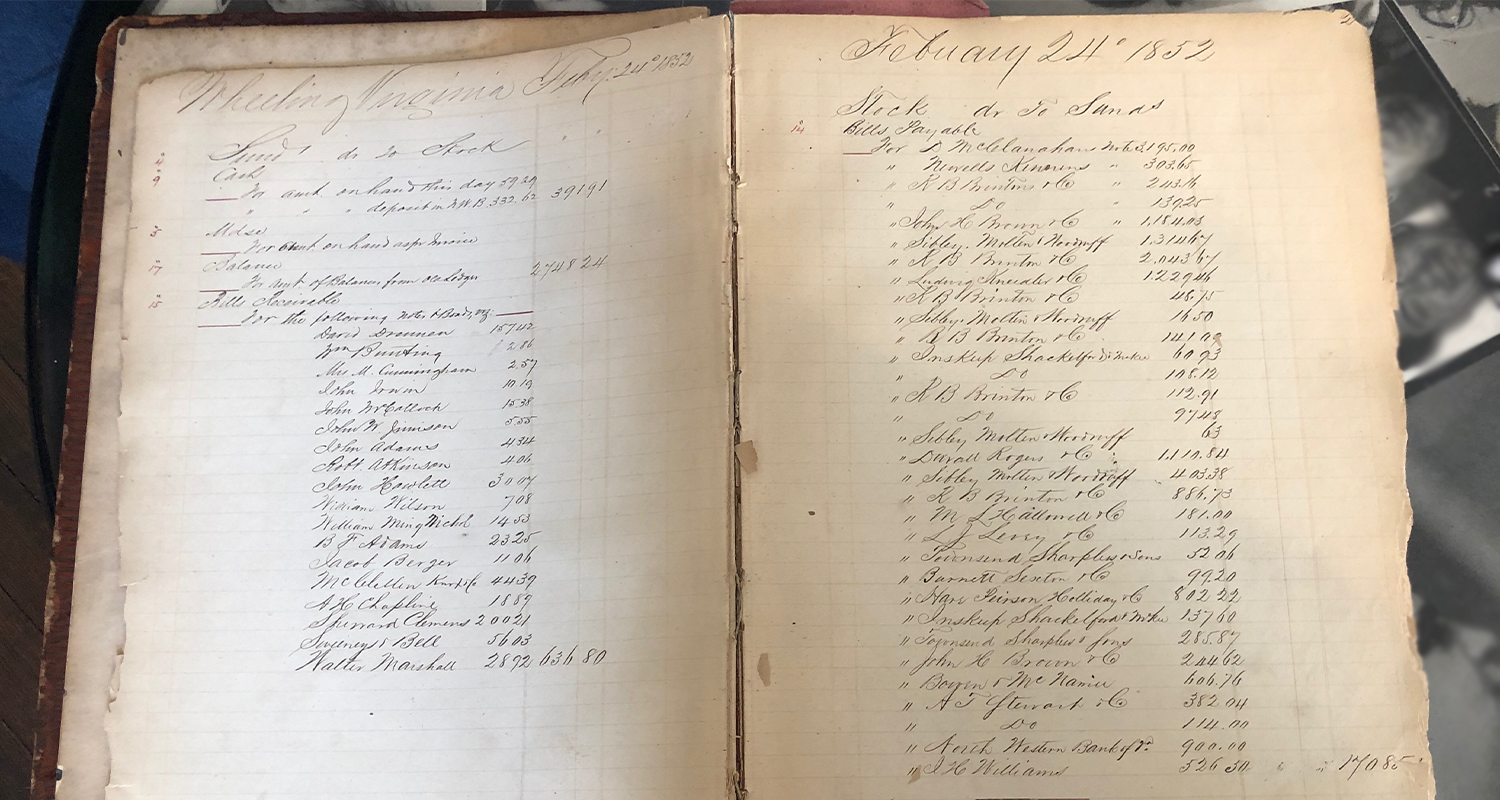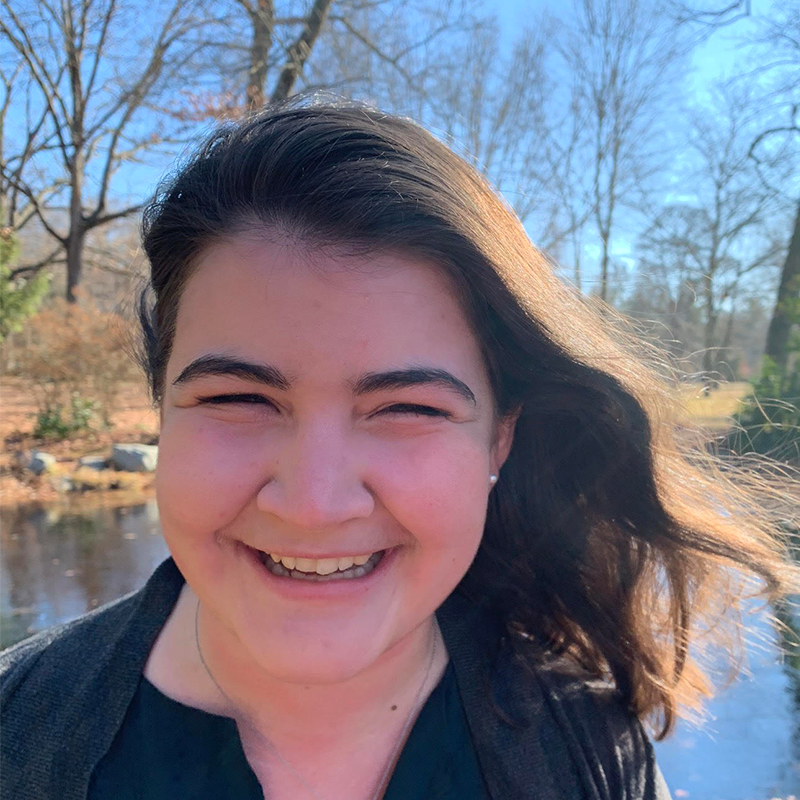Originally published July 30, 2021
In April 2020, while many people were working from home and shutting down shops and businesses to ride out the global pandemic, April and Jay Arritt discovered an amazing historical gem while cleaning out their shop – The Outdoor Store.
At the start of the pandemic, the Arritts decided to move on to a new adventure and decided to sell their building that housed The Outdoor Store on Main Street. On an old bookshelf, mixed in with jewelry they used to sell, they found a large ledger book from the 1850s. A ledger is a book that contains the financial transactions for a business and usually has records of goods and/or services bought and sold. According to April, the ledger “had always been there, but we just ever really looked at it.”
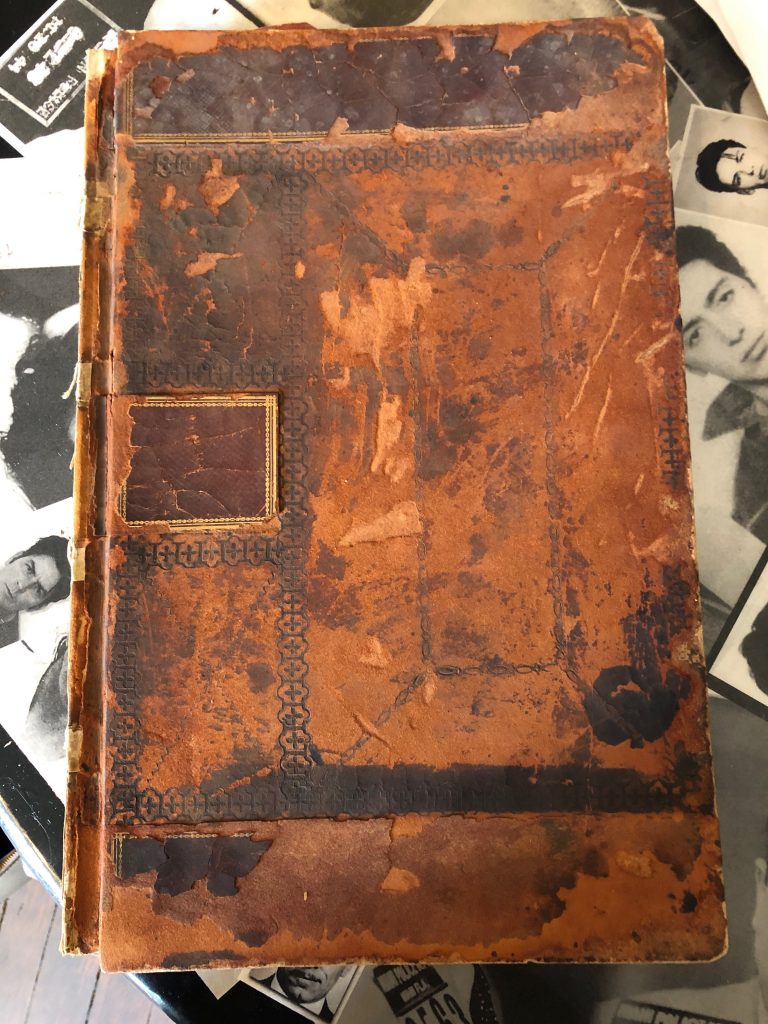
Eventually, the Arritts got in contact with Jeanne Finstein at Friends of Wheeling who researched some of the people who show up in the ledger. While the ledger itself doesn’t include the name of the business or owner of the business, it does include dozens of names of Wheeling residents and their purchases. Based on the items sold, it was most likely a wholesale dry goods business where patrons bought goods to then use or sell in their own businesses.
The ledger only spans a little less than two years, from February 1852 to January 1854, but allows a glimpse into the community interactions at the time. These were Wheeling residents—some of whom show up in other Wheeling history stories—who were shopping at the same place, possibly engaging in conversations about current events, the neighborhood, politics, the weather, their families, or a myriad of other topics. Check out some of the names and their stories that show up in this ledger from pre-Civil War Wheeling!
Andrew J. Sweeney—City Mayor
While some of the names in this ledger were ordinary people whose greater lives may be difficult to piece together over a century later, Andrew J. Sweeney is a name that stands out.
Merely a few years after his purchases were recorded in this ledger, Andrew Sweeney was first appointed temporary mayor of Wheeling in 1855 for a month. He was then elected three more times, serving terms from 1861-63, 1865-68, and 1875-81.1 In addition to being one of the longest serving mayors in the city’s history, Andrew Sweeney is even more famous for bringing electricity to Wheeling. Sweeney first saw electric arc lighting being used to illuminate city streets while serving as one of the U.S. representatives at the Paris Exposition in 1878. Four years and two companies later, on September 13, 1882, electric lighting first appeared for the first time in Wheeling at four businesses, thanks to Andrew Sweeney and the Wheeling Electric Co.
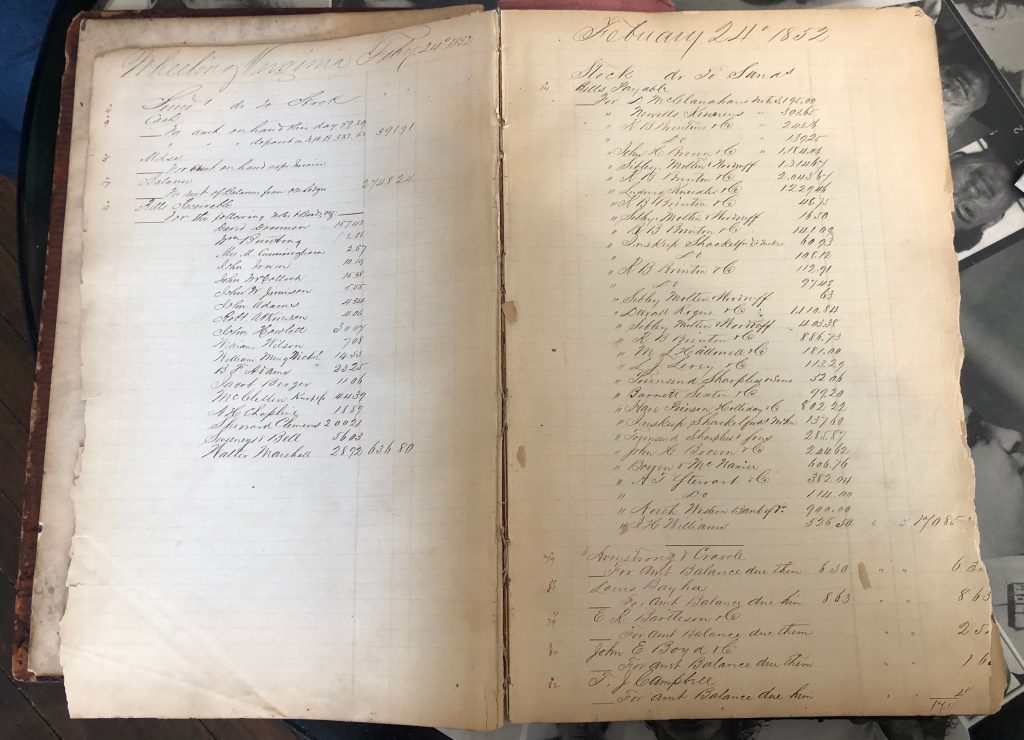
Sisters of Visitation
Patrons from many different backgrounds and lifestyles shopped at this business and are included in the ledger records…including nuns. The Visitandines, also known as the nuns of the Order of the Visitation of the Blessed Virgin Mary, arrived in Wheeling in April 1848. They were invited to the city by Bishop Whelan, the head of the diocese, to start a school for young Catholic girls, which they opened a mere six days later.2
The Wheeling Female Academy, eventually renamed to the Mount de Chantal Academy, opened with 30 students as the first parochial school in the diocese. The students were taught and looked after by the Sisters and the school was incorporated in April 1852 by the state of Virginia.3 While the Sisters took a vow of poverty, they would’ve still needed to shop at a local business for provisions for themselves and supplies to run the Academy – which included room and board options for some of their pupils.
Simon P. Hullihen—“Father of Oral Surgery”
Shopping at the same business as the city mayor, nuns, and the numerous other city residents were the physicians that tried to keep everyone in the area healthy. Dr. Simon Hullihen was a special case; his work was so impactful to the medical field that he has since been dubbed “The Father of Oral Surgery.”
Dr. Hullihen specialized in dentistry and oral and head/neck surgery at a time when it wasn’t well-respected in the medical field. As a pioneer in the field, he developed many of the early procedures and standards for oral surgery, including fixing cleft lips.4
Dr. Hullihen may have bumped into a few of the nuns while at the business and would’ve had plenty to talk about. In 1850—a mere few years before this ledger started recording business—Dr. Hullihen, along with Bishop Whelan and the Catholic Diocese, founded one of the most impactful institutions in the city—Wheeling Hospital.5 While not the Visitandines, a different order of nuns, the Sisters of St. Joseph, staffed the hospital and were instrumental in expanding medical care in Wheeling. At the time it opened, it was the only hospital between Pittsburgh and Cincinnati – a distance of about 410 miles along the Ohio River.6
Unfortunately, Dr. Hullihen died less than a decade later, in 1857 from pneumonia, but his legacy of Wheeling Hospital has continued to serve the community into the present-day.7
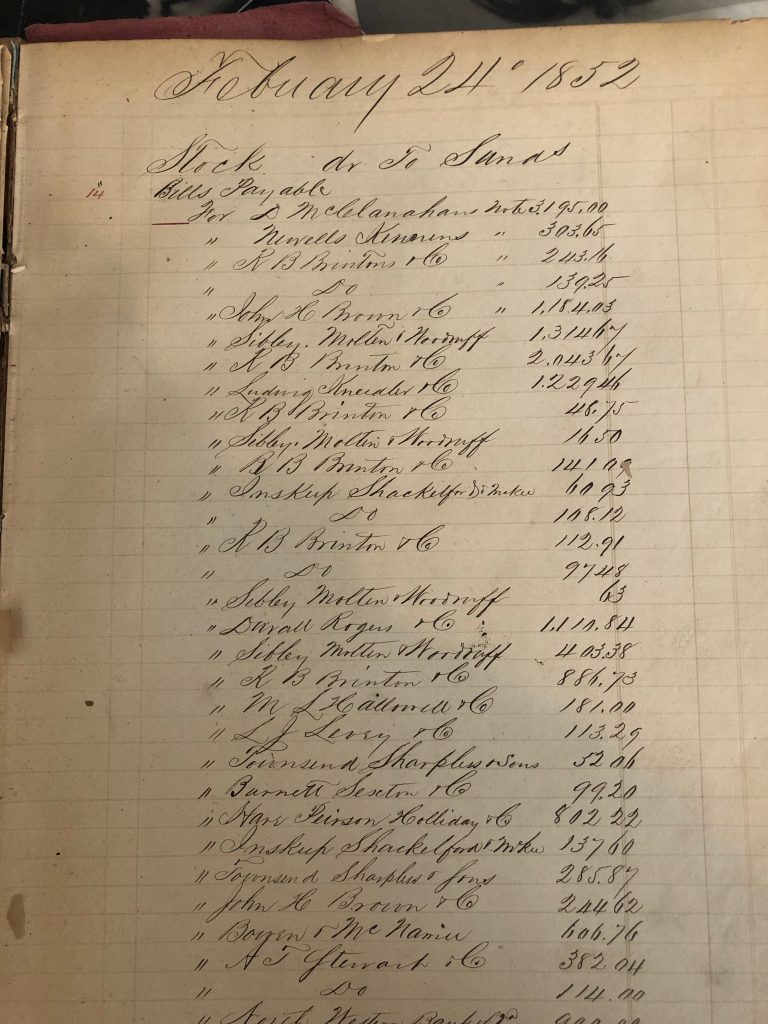
Sherrard Clemens
At the time that this ledger was keeping track of the various purchases from nuns, mayors, doctors, and many more, a rising young politician (and cousin to the famous writer, Mark Twain) would also stop by to pick up items he needed.
Sherrard Clemens, a Wheeling lawyer, was in his early 30s when he was elected to the US Congress as a representative from Virginia in late 1852, to fill a vacancy. After ending his first term in 1853, when he was re-elected to two subsequent Congresses in 1857 and 1859, serving a total of a little less than five years.8 When the Civil War started and the western counties of Virginia broke from the rest of the state to form West Virginia and stay part of the United States, Clemens—although a Democrat and married to a southern woman from Louisiana—opposed secession during the Virginia Convention.9
While Clemens opposed secession, he was still an enslaver. In 1860, Clemens is listed as owning at least two enslaved people in the Ohio County “Slave Schedule,” including a man named Henry Boose, who eventually would go by Henry Boose Clemens even after emancipation.10 To learn more about Henry Boose Clemens, his barber career, and his political leadership, click here.
Several years after shopping at this unnamed Wheeling business, Clemens was involved in a duel with O. Jennings Wise, son of the Virginia governor, in Richmond where he ended up badly wounded.11 Clemens returned to Wheeling, but moved to St. Louis, Missouri within a few years. While Clemens ended up living his final years away from Wheeling, the incorporated town of Sherrard, just south of Wheeling in Marshall County, was named after the congressman—reportedly because he secured the post office for the community.12
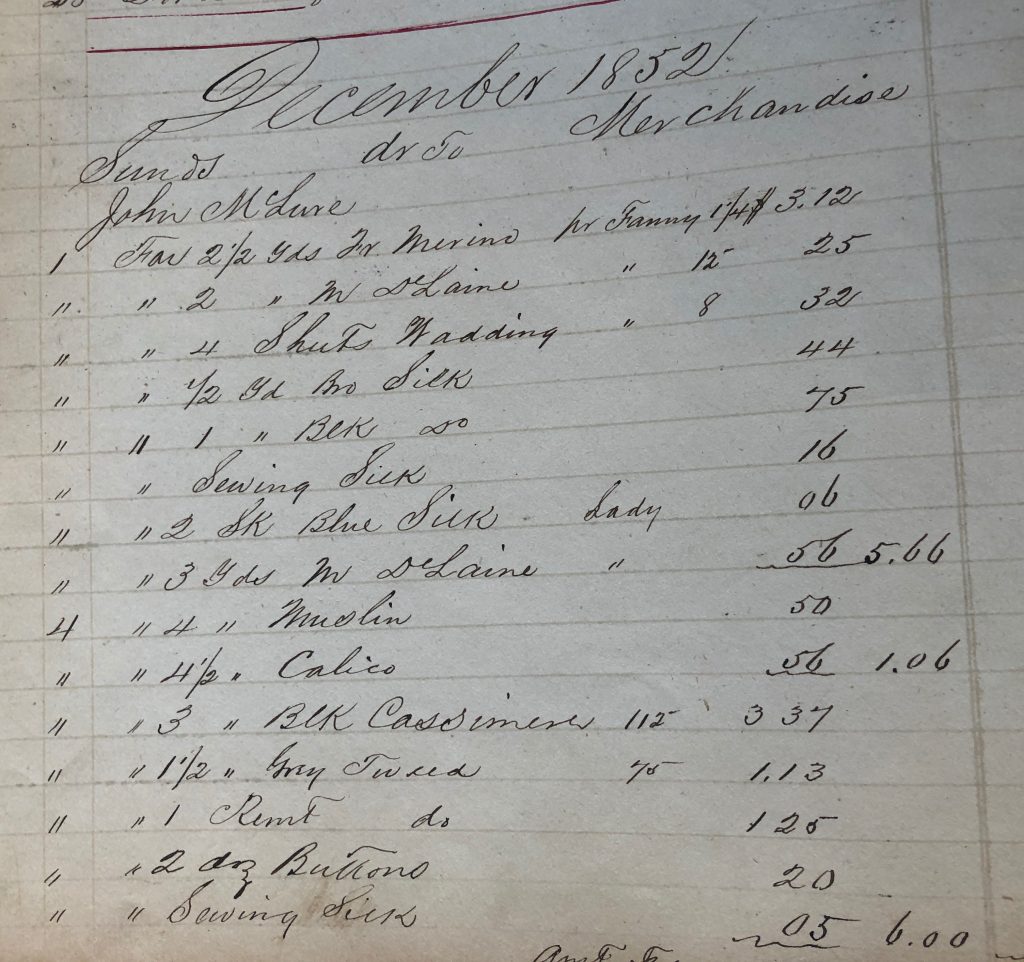
The ledger has been so well preserved because it has remained in a constant, undisturbed environment—probably for decades. The Arritts don’t know what they are going to do with the ledger yet, but if you have any historical Wheeling artifacts or documents that you can no longer care for, please contact the Ohio County Public Library or Wheeling Heritage. While there are many details that we may never know about this ledger, the person or people recording the transactions, or the business itself…we can still explore and imagine the different interactions, conversations, and lives glimpsed through this ledger.
Special thanks to April Arritt for access to her ledger and to Jeanne Finstein for her extensive research.
• Emma Wiley, originally from Falls Church, Virginia, was a former AmeriCorps member with Wheeling Heritage. Emma has a B.A. in history from Vassar College and is passionate about connecting communities, history, and social justice.
References
1 “List of Wheeling Mayors,” Ohio County Public Library, accessed July 16, 2021, https://www.ohiocountylibrary.org/history/list-of-wheeling-mayors/7068.
2 Barbara J. Howe, “Pioneers on a Mission for God: The Order of the Visitation of the Blessed Virgin Mary in Wheeling, 1848-1860,” West Virginia History 4, no. 1 (2010): 59.; Jon-Erik Gilot, “A Spiritual Legacy–Women Religious in Wheeling,” Weelunk, July 31, 2018, accessed July 15, 2021, https://weelunk.com/a-spiritual-legacy-women-religious-in-wheeling/.
3 Centenary of the Convent of the Visitation: Mount De Chantal, Wheeling, WV, 1948.
4 Robert M. Goldwyn, “Simon P. Hullihen: Pioneer Oral and Plastic Surgeon,” Plastic and Reconstructive Surgery 52, no. 3 (1973): 253.
5 Howard A. Kelly, American Medical Biographies, (Baltimore: The Norman Remington Company, 1920), 575.
6 Barbara J. Howe and Margaret A. Brennan, “The Sisters of St. Joseph in Wheeling, West Virginia, during the Civil War,” U.S. Catholic Historian 31, no. 1 (2013): 24.
7 Howard A. Kelly, American Medical Biographies, (Baltimore: The Norman Remington Company, 1920), 576.
8 “Clemens, Sherrard,” History, Art & Archives: United States House of Representatives, accessed July 15, 2021, https://history.house.gov/People/Detail/11075.
9 “Sherrard Clemens: Death of a Former Distinguished Citizen of Wheeling” Wheeling Intelligencer, June 8, 1880, p. 4.
10 Sean Duffy, “Topping the Town’s Tonsorial Trade: The Life and Times of Henry Boose Clemens: Slave, Barber, Political Leader,” Archiving Wheeling, February 15, 2021, accessed July 20, 2021, http://www.archivingwheeling.org/blog/henry-boose-clemens-wheeling-slave-barber-and-political-leader.
11 Christina Fisanick, “Wheeling Leaves Its Mark on Twain,” Weelunk, January 11, 2019, accessed July 20, 2021, https://weelunk.com/wheeling-leaves-its-mark-on-twain/.; “Sherrard Clemens: Death of a Former Distinguished Citizen of Wheeling” Wheeling Intelligencer, June 8, 1880, p. 4.
12 “Marshall County,” West Virginia Archives & History, West Virginia Department of Arts, Culture and History, accessed July 15, 2021, http://www.wvculture.org/history/archives/counties/marshall.html.


